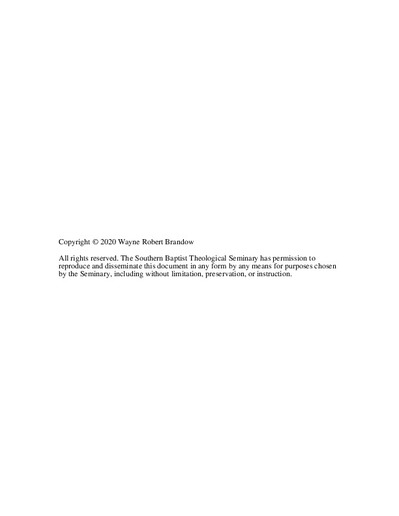| dc.contributor.advisor | Haykin, Michael A. G. | |
| dc.contributor.author | Brandow, Wayne Robert | |
| dc.date.accessioned | 2020-12-03T14:50:34Z | |
| dc.date.available | 2020-12-03T14:50:34Z | |
| dc.date.issued | 2020-11-30 | |
| dc.identifier.uri | https://hdl.handle.net/10392/6420 | |
| dc.description.abstract | The Separate Baptists who settled New York in the 1780s came from New England. They were both Calvinistic and missions minded. A shortage of pastors necessitated a strong congregational framework and associational ties with other Baptist churches. Many churches were organized without a pastor. These believers, who were settling the newly cleared wilderness, covenanted together in a church relation. The church covenant was not only the instrument to establish a church, but it was also used to sustain its life, as believers covenanted together to provide watch-care over each other. This thesis shows how their congregational polity was exercised in their monthly covenant and conference meetings in which the church covenant was an essential building block. This paper hopes to sound a voice from the past that introduces into current Baptist thinking another model of governance and polity to consider, one used by our Particular Baptist forebearers, in addition to the Presbyterian model prevalent today. | en_US |
| dc.subject.lcsh | Second Baptist Church (Galway, N.Y.) | en_US |
| dc.subject.lcsh | Separate Baptists--History--18th century | en_US |
| dc.subject.lcsh | Baptists--New York--History--18th century | en_US |
| dc.subject.lcsh | Covenants (Church polity) | en_US |
| dc.title | The Centrality of the Church Covenant among Early Separate Baptists on the New York Frontier | en_US |
| dc.type | Electronic thesis | en_US |
| dc.type | Text | |
| dc.type.qualificationname | Th.M. | en_US |
| dc.publisher.institution | Southern Baptist Theological Seminary | en_US |
| dc.publisher.department | School of Theology | |

